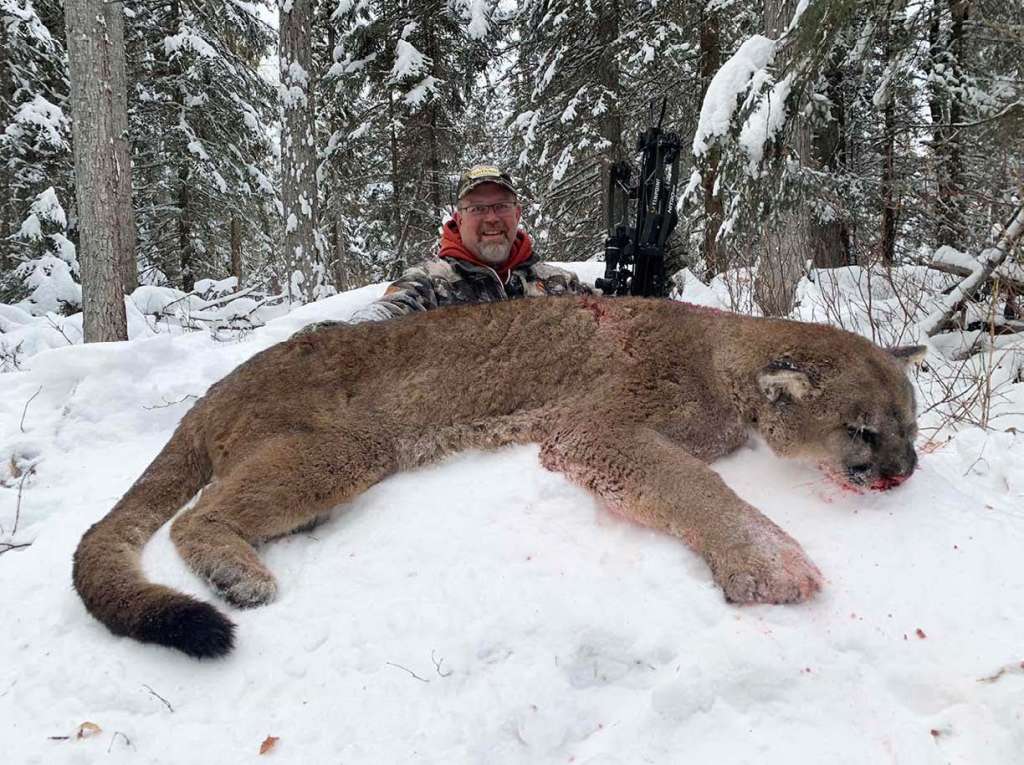Having hunted cougars or mountain lions several times, I longed to chase a big tom. Most of the excursions were in British Columbia, and most ended with poor results. Big cats are challenging to find and they are even more difficult to catch up with and tree.
Many years ago, a landowner granted me permission to hunt a cat while on private ground, but only if we harvested any cat we treed. After an all-day chase, I did take a nice cat, but it wasn’t the monster tom I had dreamed of chasing.
My desire to hunt a big cat never waned. If anything, my desire to cut tracks, be around hounds and feel the excitement of the chase only continued to grow. The pivotal point in taking action came when I saw my buddy Clint Taylor on social media. Clint took his mom on a lion hunt, and she arrowed a grand old tom. Taylor’s phone started ringing immediately. I bombarded him with questions about the who, what, where, when and how of cougar hunting.
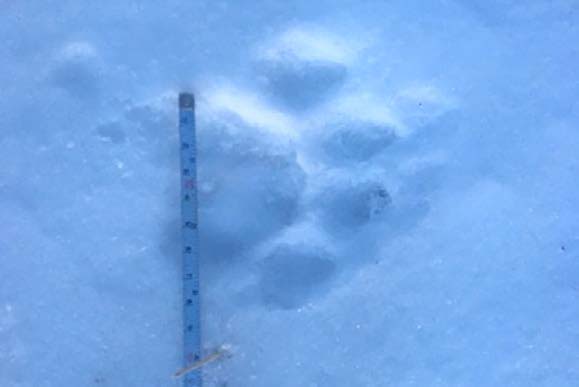
Cat ‘Disease’
Clint caught the cat disease years ago and has been an avid chaser of felines ever since. For anyone who has tried it, the addiction to the excitement is understandable. Working with dogs and trying to outwit a shy and strategic predator can quickly get in your blood. My cougar query led to an introduction to Kelly Morton. We had a long talk and I decided to book a hunt. Cougar hunting is difficult to do on your own, and having an experienced houndsman and hounds is vital to success. A handful of cats is taken every year by chance or with predator calls, but most are taken with seasoned hounds and houndsmen. Even more important is a team working in the background to search for tracks, cover an incredible amount of country, and know how to judge the track of a big cat from a mediocre one. A team can cover hundreds of miles of big cat territory daily.
Long before the December 1 season opener, the cougar-crazed team was busy “cutting’ or looking for fresh tracks. Conditions weren’t ideal, but plenty of tracks were cut–just not the right one.
A trophy cat can be judged by its track, and the minimum size for chasing with my team was 2 3/8 inches on the back pad. Clint and I spent some time cutting before Christmas, and I’m sure I drove him crazy with the never-ending questions. I learned a lot about Alberta’s cougar population, where and how they hunt, how efficient they are, and how big their territories extend. The big males can cover an incredible amount of territory, and just because you cut a fresh track does not mean you will catch up with the nimble feline.
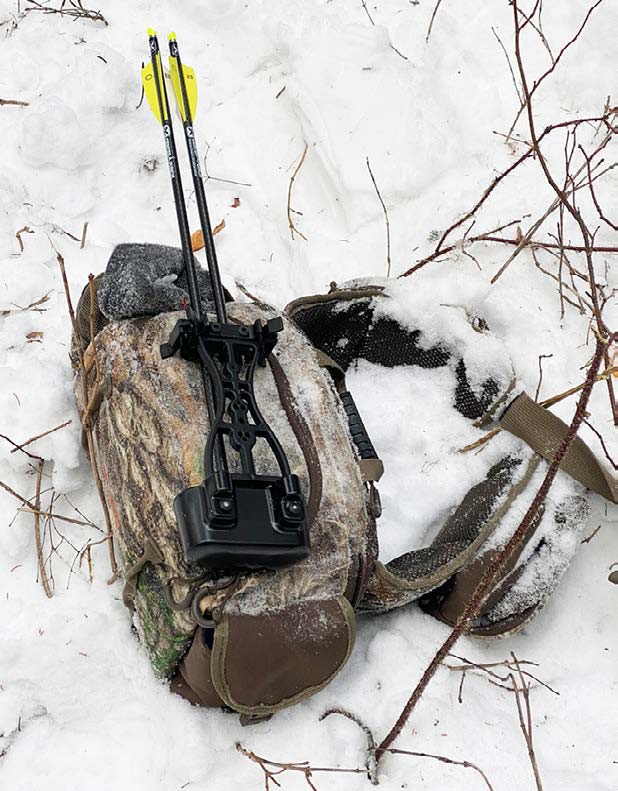
Quota System
Anyone who has hunted cougars in Alberta knows that close and careful management is achieved through a quota system. It’s necessary to check information on a website daily. . Every Cougar Management Area (CMA) has a male and female cat quota. When the allocation is met, the CMA is closed to hunting. Some find the quota system frustrating since you can get on a fresh set of tracks only to have the zone closed the next day. However, avid cat hunters have more respect for the animal than a desire to overharvest.
Cougar hunting and cutting was a tricky business for several weeks with cold, miserable weather. My lucky break came late on New Year’s Day with news that the crew had cut a big cougar track in a remote area. Several of the team were running cutlines, pipelines and any other linear access with snowmachines to find out where the cat might be headed. The first question for me was, “Can you get here first thing in the morning?”
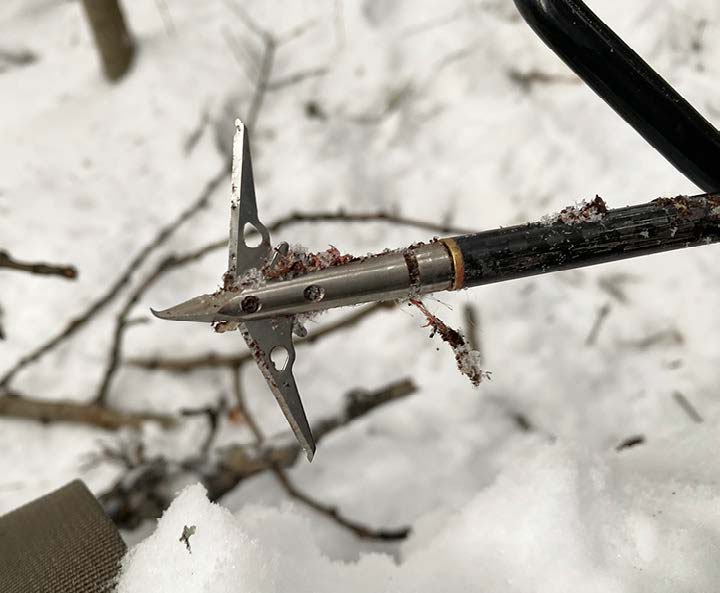
A Quick ‘Yes’
I was quick to say yes and start organizing gear and crossbow equipment to run through deep snow and keep warm if we caught up to the cat. My journey started long before sunrise. Sleep had evaded me most of the night from dreaming about the next day’s events. The cutting team was still trying to freshen up the track and determine if the cat would settle into an area. Kelly’s life partner, Chelsey, phoned with directions and told me it looked like the cat was in a block of big timber with no exit tracks. The cat had covered over five miles of mature boreal forest since the first track was located.
The crew sent a pin directing me to the remote destination on a forestry haul road. I followed the directions on my phone to wind my way through a maze of roads. The excitement came fast when I turned a corner and saw my crew anxiously waiting for me. The dogs were on leashes and eager to embark on a chase. The hunting crew bounced around, organizing collars, GPS units, and equipment.
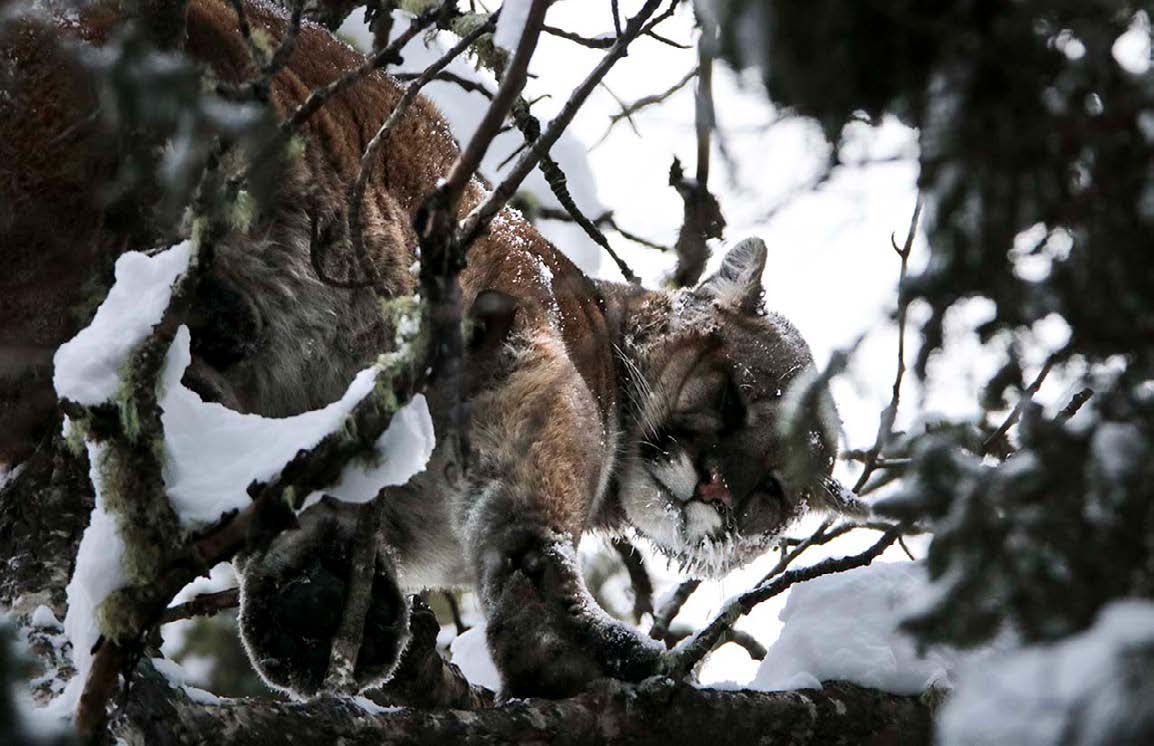
Everyone Ready
Kelly was away in B.C. running cats, and Chelsey met me with a smile and quickly introduced me to the team. The smile on everyone’s faces told the story. The track was big and fresh; everyone was ready to turn the dogs loose and start the chase. It only took me a few minutes to get organized and join everyone at the track, where the two lead dogs expressed their excitement and enthusiasm to get started.
We trudged along as fast as possible, pushing snow up to our knees with every step. It was a workout. Within minutes, I knew it would be an intense exercise. We maneuvered over and around never-ending deadfall and listened to the barking of dogs in the distance. It was interesting to watch the chase unfolding on the GPS tracker. The dogs with GPS collars showed up on our handheld, illustrating the circling trail the cat was leading them on.
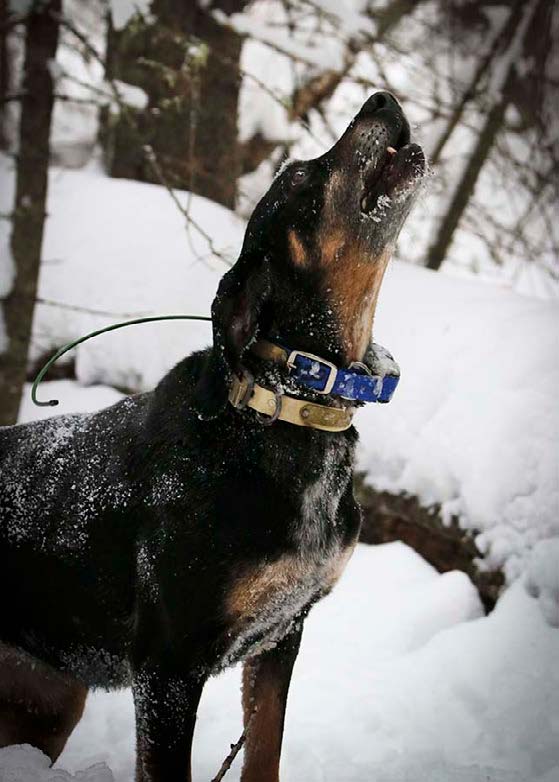
Treeing the Cat
The cat swept around a lake and headed down the far shore. We decided to shortcut the pursuit and cut around the bottom end of the lake to pick up the tracks. Unfortunately, the cat turned away and led the dogs in the opposite direction. Twice, the old tom gave the dogs the slip, but the experienced hounds circled, picked up the scent, and were able to continue the chase. The older dogs had an uncanny sense of what the cougar was doing and how to unravel the scents.
We had already been tromping through the deep snow for over a mile when the dogs started barking “treed.” We were a long way from the dogs and had to backtrack and meet up with some team members with snowmachines and a quad to get around the lake and close the distance. The excitement level was easy to determine. The dogs had the cat cornered on the ground or up a tree, and the excitement in their voices told the story.
When we arrived, the hounds were singing their exciting song and trying their darndest to climb a big old aspen to get to the cat. We had been on the chase for over three hours, but it was worth every step. In the upper branches was a giant old cat with ears extending from the side of his pumpkin-sized head. The cat’s curving tail looked as long as its body, and its front legs rippled with toned muscle. We scrutinized the cougar and knew it was a big one. It was in a comfortable sleeping spot and could care less that we gathered below.
The shooting angle to the top of the tree was steep, and we analyzed shot placement. I prepared my TenPoint Nitro 505 crossbow and shooting sticks. A gray patch of fur in the armpit of the tom would be the entrance point to ensure my SEVR broadhead found vitals. The SEVR Titanium 1.5 could provide fast penetration and minimize damage to the hide. The tangle of limbs would require careful aim and threading an arrow into the vitals from below.
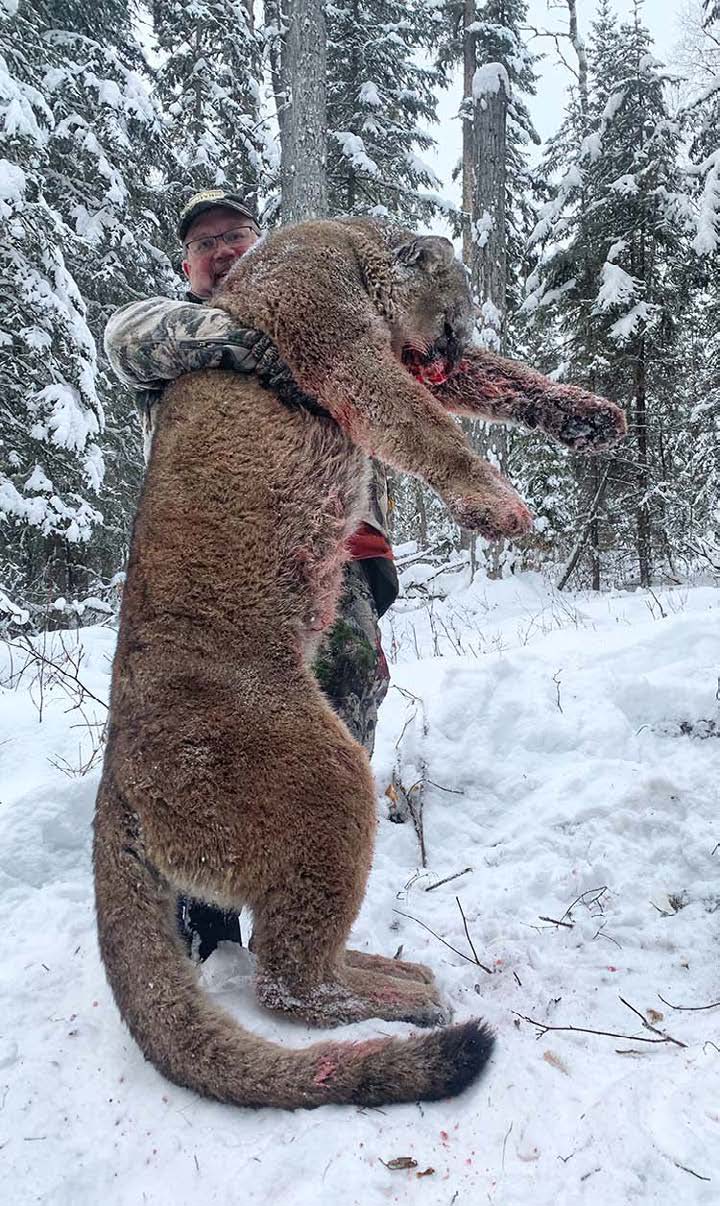
Cocked and Ready
- Hunters must dress for success and regulate body temperatures while on the chase and when stopping to assess cats or roundup hounds. Dress in layers to ensure you stay dry and have something warm when physical activity slows. Snowshoes may help and should be packed.
- Have a change of clothes for the end of the day. Being cold and wet after dark is never fun, and making yourself comfortable after a long day in the field is essential.
- Know what a big track is before you start hunting. A big tom will leave a distinctive track, and any experienced cougar hunter will carry a measuring tape to judge the back pad on a print. A mature cat will have a minimum of 2 3/8-inch pads. If you want to harvest a big, mature tom, leave the smaller tracks alone and keep cutting for something bigger.
- Practice angle shots with the tool you plan to hunt with for a cat. Archers must bend at the waist to maintain a level third axis and shoot straight. Crossbows may require shooting sticks for stability in tight quarters. Pulling a target up in the trees to practice shooting straight can be the most crucial part of a hunt.
I cocked my crossbow and slid an arrow down the rail before sitting against the base of a tree for support. The temperature had dropped quickly, the wind made it feel even colder, and I did not want to start shivering. The crossbow was anchored on extended shooting sticks to accommodate the crazy angle. I checked with the team to ensure everyone was ready. With the dogs tethered to nearby trees, it was time to take the shot. A deep breath helped me steady the bow, and I placed my crosshair on the tiny gray spot of fur we had discussed. I slowly squeezed the trigger until I heard the resounding whack of the broadhead finding its mark.
The shot was perfect. The cat slumped over instantly, getting hung up in the tree for a few seconds before tumbling through limbs that broke and scattered everywhere. The dogs went crazy, anticipating the cat finding its way to the ground. When the cat found land, it looked much larger than it did in the tree.
The immense size of the cat became apparent when it hit the ground. It was much bigger than we had expected. We ensured the arrow was not a danger to the dogs before letting them worry the carcass, a reward that etches the smell of a cat in the dog’s brain.
Chelsey had led and executed a perfect hunt, and everyone involved felt ownership and pride in our success. This is difficult to explain, but harvesting the cat is not always the day’s highlight. What is the highlight is the total experience, doing things correctly so that the cat doesn’t frustrate the crew or harm the dogs. The hounds are hunters with keen noses designed to assess and rework tracks to stay on the cat.
New Record
I feel spoiled with the results of my hunt. The cat not only made Boone & Crockett but is the new Safari Club International (SCI) world’s record crossbow-harvested cougar, with a score of 15 4/16. Cougar graces a table with lean, light-colored meat that is surprisingly good. A big bonus to the hunt was about 50 pounds of fresh meat.
I felt fortunate to hunt a unique species carefully managed in my home province through a quota system. The area where we hunted allows two male cougars to be taken each year. When the quota is filled, there is no more hunting. Some areas had already closed, and I feel fortunate to have taken an outstanding cat on a memorable adventure.
Kelly runs cougars, bobcats, lynxes, and black bears in British Columbia, and someday I hope to be back on the trail of a cat with his well-trained hounds. Hunting cats can be an emotional subject for some. However, they are managed carefully to protect the species and their role and interaction with other wildlife. Taking an old mature tom was a bucket list adventure that also provided excellent table fare.
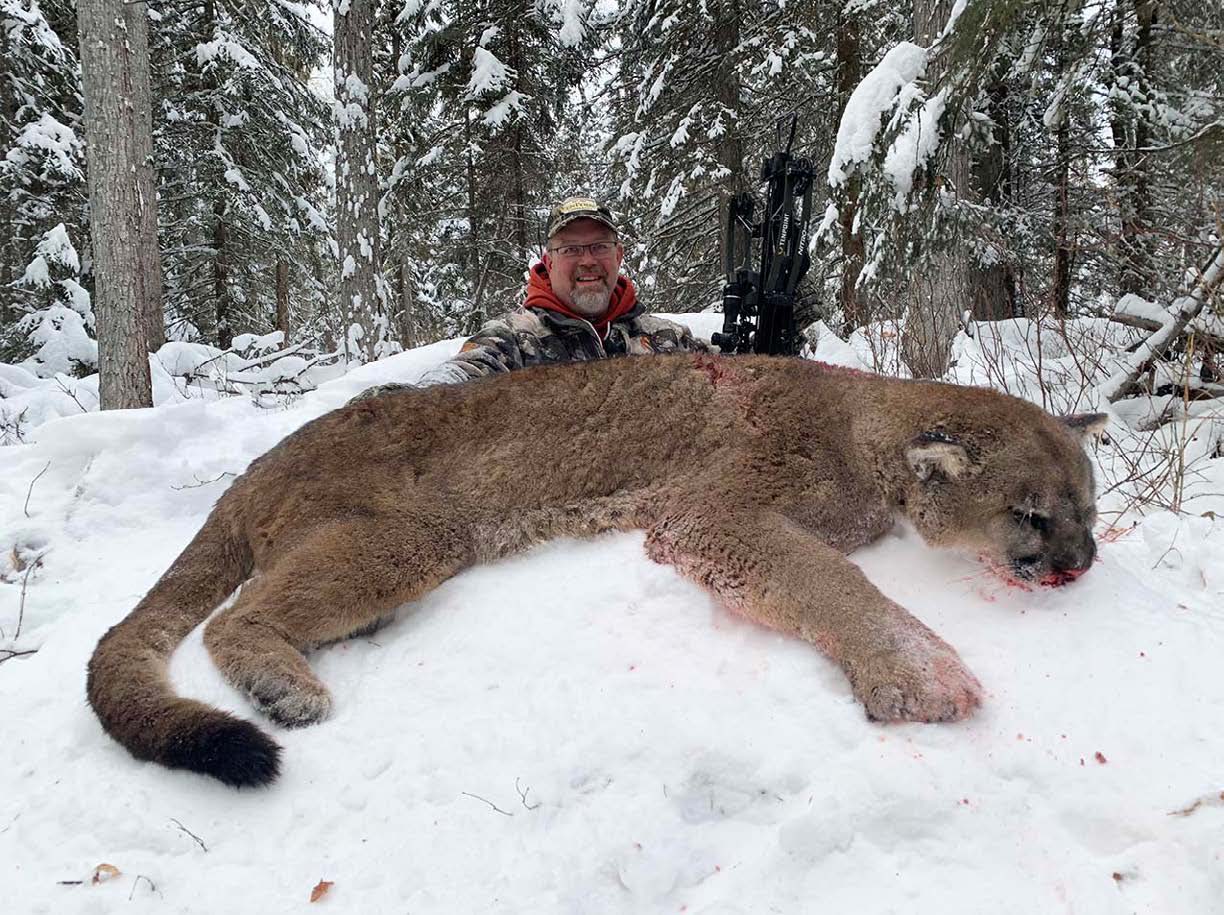
Per our affiliate disclosure, we may earn revenue from the products available on this page. To learn more about how we test gear, click here.



